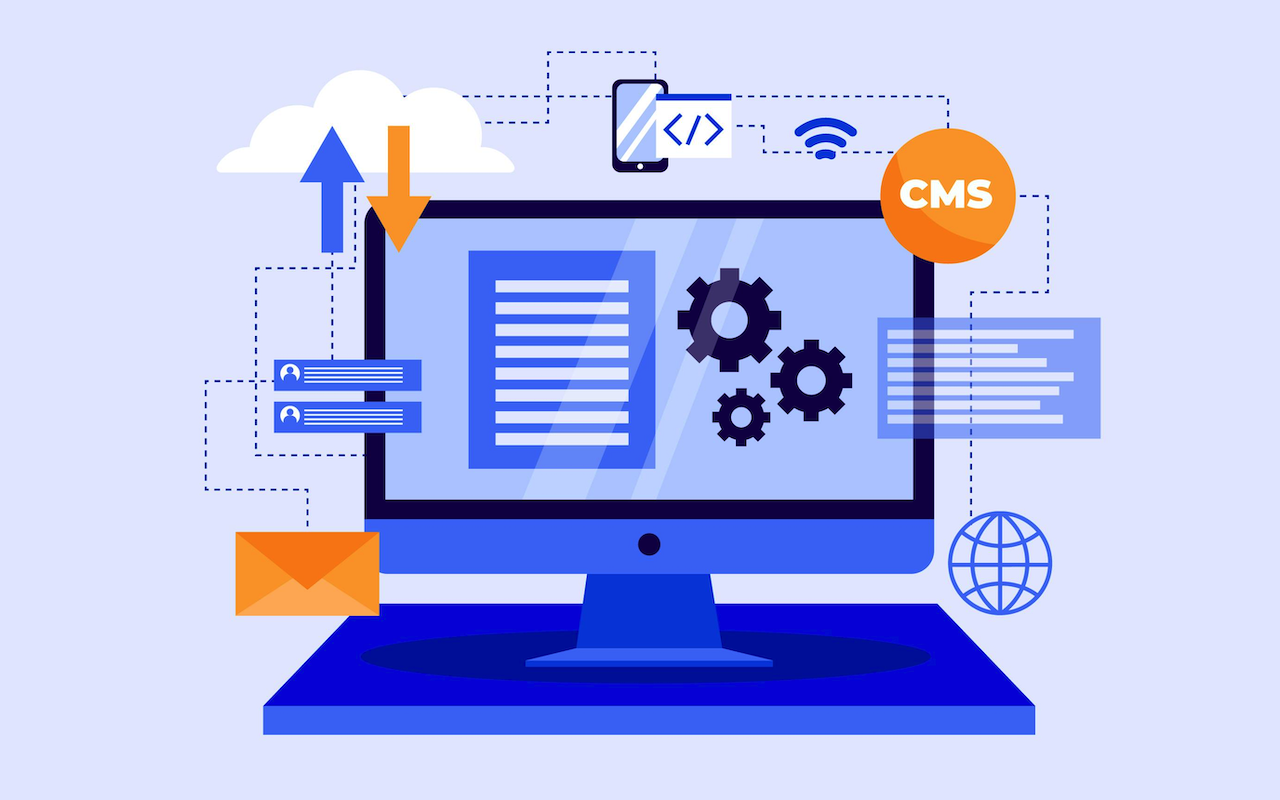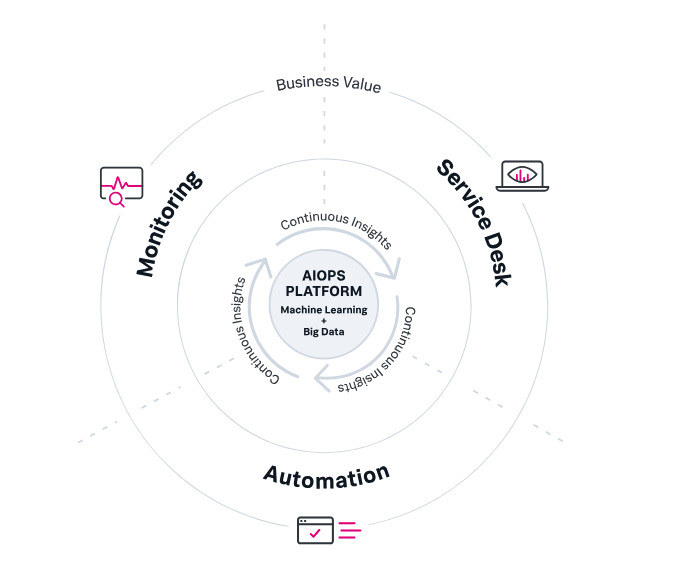
Artificial Intelligence in IT Operations has allowed businesses to proactively respond to security incidents, enhance network efficiency, lower troubleshooting time, and achieve higher cost efficiency. Surprisingly, 78% of companies utilize AI in IT operations, and business leaders are focused on driving process efficiency to enhance workflow all the time! AI can increase the business efficiency of employees and save an average of rel="noopener nofollow">2.5 hours every day.
However, companies that handle their IT infrastructure using traditional methods would never be able to scale their business performance. They require AIOps platforms, an innovative system that handles all the technical aspects of IT operations, both frontend and backend. This blog covers on AIOPs, it’s benefits, challenges, few applications and future trends.
But first, do you know…
What is AIOps?
Artificial intelligence for IT operations (AIOps) is an advanced platform that leverages big data and machine learning for IT operations to automate various IT service management (ITSM) processes.
AIOps platforms empower professionals by providing the essential support to manage their complex IT systems. It ultimately safeguards the organization through its AI-driven IT management process automation, predictive maintenance, and security monitoring services.
Here’s a graphical representation of how AIOps functions:

Source: Splunk
As a result, 72% of organizations have implemented AIOps to manage their complex IT processes.
Some of the technical capabilities of AIOps are:
- Data analysis across various sources
- Performing a diagnosis to detect the anomaly sources.
- Autonomous resolution implementation to lower the mean time to resolution (MTTR)
- Discover irregular patterns that can lead to operational failure, other security concerns, and so on.
Benefits of AI in IT Operations (AIOps)
AIOps has a proven reputation for boosting team efficiency by prioritizing self-sufficiency and achieving autonomous IT operations. AIOps is a smarter IT solution that enables professionals to focus on essential tasks and transition IT personnel with agility, allowing them to function optimally.
AI in IT industry has transformed the entire dynamics of the IT operations. The influence has been witnesses across various sectors within the industry. Below are some of the benefits of AIOps platforms in IT operations:
Benefits of AIOps in IT industry
- Business Scalability
- Faster resolutions
- Cost efficiency
- Higher productivity
- Proactivity in IT operations
1. Effective Collaboration for Higher Productivity
AIOps creates a safety net that enables IT professionals to address the most critical issues through its filtering capabilities and systematic categorization of incidents. By leveraging the advanced insights, IT professionals can effectively collaborate with cross-functional teams to achieve significant productivity gains.
2. Faster Resolutions
AIOps applications multiply your efforts in identifying and troubleshooting the root cause of the issue simultaneously. Thus enabling the IT teams to identify and deploy immediate solutions for reducing the mean time to resolution (MTTR)
3. Cost Efficiency
IT teams equipped with AIOps can identify technical irregularities and issues more quickly and work towards implementing resolutions rapidly. It eventually lowers downtime costs, and overall, AIOps systems can coexist and function with a minimum of workforce interventions.
4. Proactivness in Handling IT Operations
Organizations using an AI-driven IT management solution (AIOps) can receive predictive maintenance alerts, enabling them to proactively address potential threats and issues. It forecasts the factors that can detect performance bottlenecks, allowing IT teams to address them before they directly impact users.
5. Business Scalability
AIOps is adaptive and can easily accommodate expansive data volumes. The integrated infrastructure of the AIOps applications can uplift the operational functioning of companies in highly dynamic environments.
Potential Challenges of AIOps Platforms in IT Industry:
Witnessing challenges while using AIOps in the IT industry is inevitable. These hurdles can lead to potential business losses if not addressed in a timely manner. Some of the challenges that come along with AIOps are:
1. Fragmentation of Data Silos
IT operations are performed in different silos, using various tools for documentation and monitoring. Incorrect data entries directly lead to fragmented results, which lowers the AIOps platform's effectiveness.
Solution:
- Implement a centralized data integration platform that can document the data from various sources.
- Foster a learning environment to train the IT professionals with the right steps for data management.
- Organizations can invest in cleansing their data and refining its quality for better business outcomes.
2. Hostility towards the Changes in the Organization
AIOps platforms can disrupt legacy systems. Due to unfamiliarity with AIOps in IT operations and automation, it can lead to resistance from the workforce. This could also hamper your productivity and hinder the implementation of the AIOps system.
Solution:
- Facilitate on-the-job training for your employees to gain hands-on experience with AIOps systems.
- Maintain transparent communication with employees throughout the planning phases to minimize resistance and ensure a smooth implementation of applications.
- Boost the morale of your workforce by showcasing the beneficial values and applications of AIOps to achieve higher efficiency.
3. Data Security and Privacy Concerns
Data security and privacy concerns is another challenge that daunts the IT departments across different organizations. Since AIOps systems are required to assess sensitive user data, it can lead to a data breach or even compromise the data privacy of users.
Solution:
- Companies must develop a privacy-regulated framework within their organization to protect sensitive user data against potential threats.
- Incorporating a hybrid cloud along with on-premise storage facilities can effectively store your valuable data.
- Encourage regular data backups to minimize data loss during downtime or system shutdowns.
Implementation Of AIOps in The IT Industry
AIOps platforms are making their mark in the IT industry, as 94% of the IT decision-makers believe AIOps systems are crucial for managing IT processes. Here are a few applications on how AIOps is systematically transforming your ITSM process:
1. Root cause analysis
In the fast-paced IT industry, fixing a critical business issue is important, but identifying the "why" factor that led to the occurrence of the issue holds ultimate priority. Primarily, root cause analysis (RCA) is essential for identifying the emergence of a problem to develop a streamlined business workflow. IT Companies are able to execute RCA accurately with AIOps, which provides them with a detailed outline that leads to a specific technical failure.
For instance, a simple breach in the database can be investigated with AIOps for accurately pinpointing the root cause, which leads to an in-depth analysis and identifies the source of the breach. Furthermore, the application analyzes the events and patterns that led to the incidents and supports the IT teams in understanding the areas where their workflow is vulnerable, enabling them to avoid similar future instances.
2. Threat & anomaly detection
Organizations are constantly under the threat of cybersecurity attacks, despite having large teams, a corporation cannot provide extensive security coverage for its protection.
AIOps automates its security parameters into threat hunting approaches. With minimal intervention from IT professionals, AI-ops can single-handedly monitor security activities to detect anomalies.
In fact, these applications streamline cost efficiency by immediately identifying the factors that lead to security breaches. With their active monitoring, AIOps can alert IT departments in real-time and work towards rectifying the encountered incidents.
3. Data analysis
Companies gather more data during their business expansion phase. These acquired data are often filled with inconsistencies that hamper the quality of data; overall, it becomes redundant.
AIOps plays a vital role in organizing the information needed by IT teams to execute their business operations seamlessly. It delivers faster access to valuable insights across systems simultaneously.
AIOps is capable of visualizing complex business data to understand user behavior, system-generated performance metrics, or even security log tracking. It helps IT professionals take data and its sources to deliver insights and details that boost workflow production.
4. Optimization of System Performance
System issues can emerge at any time, and businesses must be able to identify the glitch to execute their maintenance services immediately. AIOps enhances system functionality by analyzing historical data metrics and current usage patterns to predict potential outcomes.
Companies that follow a proactive maintenance approach can prevent sudden system shutdowns, thereby minimizing downtime and resource loss. System downtime can lead to a loss of revenue, SLA extensions, and ruin the brand reputation. Businesses can optimize these shortcomings through AIOps, ensuring that these incidents do not recur anytime soon.
5. Automated Remediation
Alerting the IT teams about a malicious threat is just one of the intelligent ways AIOps can automate the security process for safeguarding your business. These applications are also capable of securing various business areas, providing a comprehensive solution for any concerns. AIOps platforms are trained with business policies and preset workflows, enabling them to autonomously deploy remediation strategies while assessing the outcome.
For instance, when an AIOps system encounters a potential network threat, it immediately analyzes and identifies the areas (software systems) that are likely to be impacted in the incident. Without any IT professional intervention, AIOps acts as a barrier between software systems and potential threats by performing real-time security updates to strengthen the system while simultaneously alerting the IT department.
The Future Trends of AIOps in IT Operations
The future potential of AIOps appears promising, as these platforms will optimize the complex IT tasks and deploy instant solutions to support your business operations. Some of the leading trends of AIOps in the IT industry are:
1. Hybrid and Multi-Cloud Setup
AIOps will play a pivotal role in securing and optimizing the IT infrastructure of companies in hybrid and multi-cloud environments. These advancements will serve as a foundation for decision-makers to balance their budgets, resolve departmental silos, reduce investment in operational resources, and provide complete transparency in business data storage.
2. Autonomous Operations
AIOps has been striving to function in complete autonomy, although this would take some time to streamline the IT operation without any intervention. However, with the progressive advancements in machine learning and artificial intelligence, they are making significant progress towards these built-in features.
3. Cross-Functional Team Collaboration
With the advancement of AIOps platforms, companies can enhance team collaboration among IT teams. This includes (ITOps), Development Operations (DevOps), and Security Operations (SecOps). AIOps systems are dissolving security considerations among teams and encouraging IT teams to operate with a connected approach. As it leads to ITOps, SecOps, and DevOps providing mutual insights, collective tool usage, and developing strategies for countering any potential IT threats to the organization.
Conclusion
AIOps platform has become a game-changer for the IT industry. Using Big data and machine learning, AIOps systems proactively safeguard organizations through system vulnerability management, automated remediation, anomaly detection, and fraud detection, among other capabilities. This directly impacts the organizations by allowing their business leaders to focus on optimizing the workflow productivity and handling other core tasks with complete security protection.
The implementation of AI in the IT industry (AIOps) has empowered businesses to streamline their work processes and deliver a top-class user experience, thereby boosting their brand reputation in the market. Lastly, AIOps has evolved from being just an assisting tool to dominating the entire security automation of IT departments, leading several business organizations towards growth and efficiency.
Featured Image by Freepik.
Share this post
Leave a comment
All comments are moderated. Spammy and bot submitted comments are deleted. Please submit the comments that are helpful to others, and we'll approve your comments. A comment that includes outbound link will only be approved if the content is relevant to the topic, and has some value to our readers.


Comments (0)
No comment